5-10-15-20
Christopher Owens
The singer/songwriter on the music of his life-- Michael Jackson, Suede, John Coltrane-- as well as his upbringing within the controversial Children of God cult.
By Ryan Dombal , January 22, 2013

Photo by Ryan McGinley
5-10-15-20 features artists talking about the songs and albums that made an impact on them throughout their lives, five years at a time. For this edition, we spoke with singer/songwriter Christopher Owens, 33, whose solo debut album, Lysandre, is out now. Listen along to Owens' selections with this Spotify playlist.

After being born in Miami, my mom had somehow moved us to Puerto Rico soon after, and the people we were living with there were moving to Hong Kong to teach English. From there, my mom ended up getting a teaching job at a university in mainland China. The appeal to go there was very strong, because we were supposed to be like missionaries within the Children of God, and mainland China was super hard line Communist at that time. So my mom was viewed as some kind of crusader amongst her little cult-- she wrote newsletters bragging about how much she was pioneering.
While my mom was teaching English in China, she took her class to see Franco Zeffirelli'sRomeo & Juliet and she brought me along. There were 500 students there and they were all eating sunflower seeds really loudly, cracking them in their teeth and spitting out the shells. It was the first time I saw a movie in a theater. I ate it up. The theme music became very special to me; it was the first time I was really moved by music. Years and years later, when I got my first keyboard, I learned to play it.
Could you make the case that that movie ruined my life, turned me into a hopeless romantic, and gave me thoughts of suicide? I don't know. But it could still be my favorite movie now.

I lived in Japan from age six to 10, and it was more big, communal living. In China, at least I was still around my mom all the time. But in Japan, we were divided up into age groups and our rooms had all kids our age. You weren't supposed to act like you had a family, which was very traumatic. I was just a very damaged kid, freakishly quiet. I didn't talk at all.
At this point, there were people that made music and released albums within the Children of God. In Japan, I was around a lot of those people because it was a place where the Children of God really had their shit together-- they had recording studios and everything there. It was the most coveted commune within the Children of God, which was made up of 15,000 people spread out across the whole world. So I was around a lot of these celebrities within our group, and there was a husband and wife harmony duo called Zac & Shelley, who I was genuinely a very big fan of. I still like them a lot now. It's really cool music-- love songs, gushy stuff-- that sounds like 70s folk. Plenty of deranged emotions. I actually lived in the same house as them for awhile. They had a daughter named Holly, who was the first person to teach me how to say bad words, like "chicken butt."
I sang with them a little bit, but it was nothing I could really brag about. We'd try to sell cassettes by singing on the sidewalk, or we'd go door to door in apartment buildings and try to sell videos and tapes as English-teaching tools for children. We pretty much survived off of selling these videos and tapes. That and just walking up and down the street with pamphlets asking for change. We did a lot of that.
"When I lived in France, the government came into some
Children of God homes and actually took all the kids away."
I moved to France when I was 10 and lived there for about three years. And by the time I was a young teenager in the early 90s, there were raids all around Europe and Asia where governments started cracking down on us because there was all kinds of child abuse and nasty things going on. When I lived in France, the French government came into some Children of God homes and actually took all the kids away. I wish that would have happened to me. The adults presented it as these horrible people coming and trying to take us. But if you were smart enough, you started to catch on that these [Children of God] people were bad. So, in my early teens, I was a famous rebel-- I was old enough to start to have hormones and get angry. I was the first person to climb on top of the roof and say: "If there's a God, strike me with lightning!" When nothing happened, I climbed down to announce to all the other kids that there was no God.

Michael Jackson was a big figure for those of us that were rebellious and recording songs off the radio while still in the Children of God. There were other people on those tapes like Bon Jovi, Lionel Richie, Guns N' Roses, 4 Non Blondes, the Cranberries, Whitney Houston. But Michael Jackson was the king. We didn't know a lot of musicians, but everybody knew Michael Jackson. He was also the most scandalous person. When we told our parents we liked him, they would pee their pants. That was like saying you liked Satan's homosexual love child. It was just the worst. There was a time where he was the Marilyn Manson of the world. He was somebody from another planet to us kids, and we didn't understand how somebody got to be that alien. Also, his lyrics were just so beautiful to somebody who was rebelling but also wanted to prove that he wasn't doing something bad at the same time. I could tell myself, "My parents are so stupid, all this guy wants to do is heal the world." There's nobody half as cool as Michael Jackson.
"When we told our parents we liked Michael Jackson,
they would pee their pants."
After living in Belgium for about six months when I was around 14, my whole family moved to Denmark, and I was sent to Norway to go to this camp for kids that were rebellious, where they would try to make us want to be good kids. I turned 15 there. Then I went home to Denmark, and my family-- my mom and her new mate, which is what they called one another because they didn't get married, they got "mated"-- wanted to go to Slovenia to do humanitarian aid work for people in the Bosnian War. By this time in the 90s, all of the adults were so aware of their guilt that they started to want to actually try to do things like humanitarian aid work. It became very trendy within the Children of God; you could live in Eastern Europe for dirt cheap and go around and sell your garbage to people for a little bit of money. By the time I turned 16, my sister had already left the Children of God and moved to Amarillo, Texas, and had a baby. She came back to visit that year so that my parents could meet the baby, and that's when she invited me to come live with her.
So I moved to the States when I was 16 and got a job at a grocery store. I worked 40 hours a week stocking shelves all night, and then I would sleep all afternoon. I didn't have a driver's license yet and I didn't have any references or experience. So that grocery store job was all I could get. I wouldn't have even been able to fathom going to high school-- that would not have worked at all. I just had no idea even how to go about enrolling and I would have been terrified. I hadn't gone to any grade school, so I wouldn't have known what anybody was talking about in the classroom, either. It just wasn't an option.

In Amarillo, I hid my past a lot. I was very aware of it. I tried to have it never come up, though it always did. Everybody knew that I was different, but they all just thought I was a really nice guy. I made friends one at a time. When I got into the punk scene, I had 50 friends and I'd just hang out with them everyday; the punk scene completely consumed my life. I could easily get all the records they listened to and learn about the bands they liked and somewhat fit in. So for about four years, all I did was hang out in that scene-- it felt OK to be an outsider because we all had each other.
I loved alternative music when I first moved to the States-- the Smashing Pumpkins was one of my favorite bands-- but when I fell in with the punk kids, I had to pretend like I didn't like that stuff. But by the time I was 20, all of us decided punk was boring. It was just going nowhere. And Suede was the first pop music that I let myself like after trying to pretend to be a really hardcore punk for a long time. The androgyny appealed to me. This friend of mine took me to his mom's house and we took her Vicodin and he played me Suede and we just sat there on the couch and listened to it. Suede was our little secret.
Then, when I was 21, I met Stanley Marsh and that helped me to learn more about the rest of the world. Stanley was very famous for being a multimillionaire and was a friend of the punks. I met him at some big lunch for a public art installation. He started asking me who I was: "What's your name? Are you from Amarillo? What do your parents do?" Within five minutes I was totally exposed. He kept probing away-- he was the first person to be very interested in my story. He immediately offered me a job and said he wanted to get to know me. I became his personal assistant and was around him everyday, just me and him in his office. We would talk all day. He would read four newspapers a day and he owned a television station. He was friends with the people that owned the banks in town and the people that owned the stores where I bought my CDs, so suddenly I was in a world that was much more sophisticated. I became more aware of everything, including what had happened to me. I was able to have some perspective.

At this point, I had been in Amarillo for nine years-- I never intended to be there that long. I was very aware that it was a small, shitty town, and that this wasn't what I wanted out of coming to America. I wanted to move since I was 19, but it was difficult without any money. But after I worked for Stanley for four years, I was 25 and I could handle myself in public with anybody and I had saved up $10,000. I could move anywhere I liked.
I hitchhiked to New York and slept in Union Square for two weeks on two separate occasions, so I knew I didn't want to live there because it was just too big and busy for me. I rode the Greyhound to Los Angeles two or three times because my sister had moved there from Amarillo, and I knew I didn't want to live there because it was so spread out and everything looks awful and it was 100 degrees. You had to wear a t-shirt; I just refused to live like that. So when I found out that San Francisco was a sophisticated city that had 60-70 degree weather all year round and was small enough to walk, I wanted to give it a try. I got here and it immediately looked like the European cities that I grew up in. I felt at home right away.
"Ariel Pink would never talk to me, though he eventually warmed up a little bit when he saw that I wasn't just another L.A. hipster."
In San Francisco, I found out about Ariel Pink, and that changed my life. He was playing bass in Holy Shit with singer/songwriter Matt Fishbeck. When I first met Ariel backstage at a show in San Francisco, it was really cool, but to be honest he was very cold and didn't really invite me in. It was Matt who had all the impact on me; it was Ariel's music, but Matt as a person. When I first met Matt, we spent the next 48 hours talking and playing music. By the end of that I was in Holy Shit, and that got me wanting to write my own songs.
Matt was the next person after Stanley who immediately could not believe what he was hearing when we started talking about myself. He thought it was really cool and wanted to be around me all the time. Ariel would never talk to me, though he eventually warmed up a little bit when he saw that I wasn't just another L.A. hipster. Ariel's very cynical. But Matt and I fell in love, in a way. He made me feel very comfortable. We had a very strong connection playing music, and that doesn't happen with everybody.

I wasn't allowed to watch most movies growing up, but wholesome old-fashioned Hollywood musicals like The Sound of Musicand Oklahoma were all movies that I'd watched a dozen times. So when I started listening to jazz a few years ago, I suddenly got really excited because I knew all the standards. I got really into it because I could understand the concepts and what they were doing with the music; how they were reinterpreting it, what it meant. And every jazz musician was an opiate addict, so I just felt this bond. I listened to John Coltrane's My Favorite Things for at least a month straight.
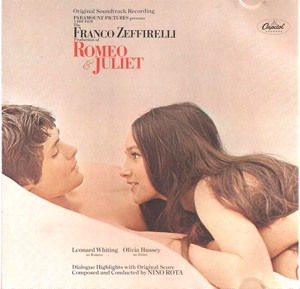
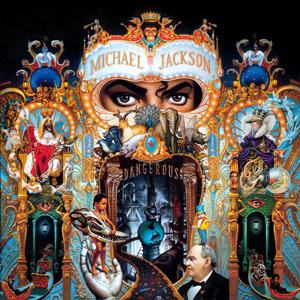 Michael Jackson
Michael Jackson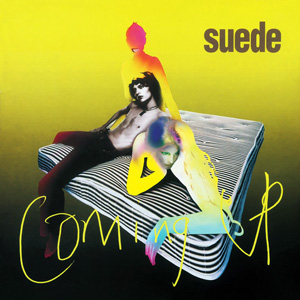 Suede
Suede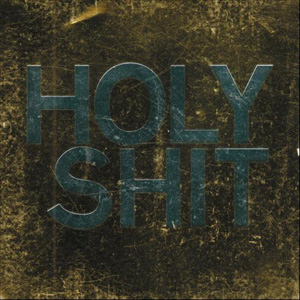 Holy Shit: Stranded at Two Harbors
Holy Shit: Stranded at Two Harbors 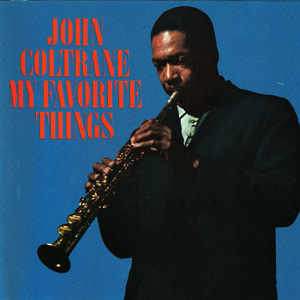 John Coltrane
John Coltrane
No comments:
Post a Comment